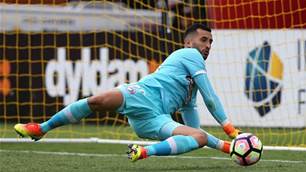Australian football needs to adapt to modern demands, not turn to nostalgia, in order to produce a new generation of high-quality and creative players says Melbourne Victory Technical and Academy Director Drew Sherman.
Discussion about the production of Generation Next in Australian football can often be a fraught one, with seemingly every facet from when a youngster first kicks a ball to when they make their A-League debut – and beyond – the subject of vociferous debate.
But one of the more generally accepted features of the zeitgeist’s conversation is that Australia, compared to decades past, isn’t generating creative and dynamic players.
The excitement surrounding Daniel Arzani’s meteoric rise to the Socceroos and a place at the World Cup ran deep not just because of his tender age, but also thanks to the bold, creative and skilful manner in which the then-Melbourne City youngster went about playing his football.
These players, the prevailing wisdom goes, are the exception rather than the norm when it comes to the production line of talent being produced by A-League clubs.
But according to Sherman, Australian football is hardly alone in experiencing what it perceives to be a sudden dearth of attacking and creative-minded players.
Instead, the Welshman says that the game Down Under is experiencing contemporary challenges that most of the globe have already been forced to come to grips with and that adaption, rather than nostalgia, is the best means of progressing youth development.
“I think that’s a global trend,” Sherman told FTBL.
“We can talk about it and bemoan the facts of Australian football, and we see that, but what we don’t realise is that we don’t have a global perspective. That’s something that was spoken about in the Netherlands 12 years ago, it was something that was spoken about in the UK in 2010.
“Everyone goes through that stage and it’s a societal issue - because we’ve gone from unstructured informal training at a high volume.
"[Unstructured, informal training] could have been going down to your local club and kicking a ball around with your peers and your father or playing in the streets as the kids do in the Favelas of Brazil or inner-city London.
“That has been removed and now the training environment is formal and it’s structured and it’s in its infancy here compared to elsewhere -- that formal structured environment. We are getting to a point where most of those nations were at ten to 12 years ago.
“The challenge is, they realised it and they adapted existing structures and adapted their approaches so that they were able to overcome it.
“We are in danger of saying the structures aren’t working and therefore we have to reinvent the wheel rather than adapt and I think that’s one of the dangers.”
Sherman, 32, holds a UEFA Pro Licence and, prior to his arrival in the Southern Hemisphere, worked in the youth set-ups of Southampton, Aldershot Town, Everton and Crawley Town. He managed the Cook Islands to their highest ever FIFA ranking and first-ever competitive international wins before being appointed as Brisbane Roar’s Technical Director in 2017.
Moving to Melbourne after guiding Roar to the 2018/19 Y-League crown, he was named Victory’s academy boss in March 2019 and in October, as he did in Brisbane, helped remove fees for youngsters in the youth set-up of the four-time A-League Champions.
Casting his eyes over the current Australian football landscape, he believes that proper perspective is required not only around the global nature of its ills but also in recognising that modern life, with all its distractions and restrictions, can’t simply be wished away to aid in developing youth.
It’s not a unique view in footballing circles; a 2019 study from Professional Footballers Australia examining the factors that led to the creation of the Golden Generation identifying the need to not attempt to re-create the conditions of the late ’80s and early ‘90s but, instead, to find new socially and culturally appropriate “inputs” that would lead to the similar “outputs” of the Golden Generation.
“You’re talking about people saying ‘well, in the older systems we were producing more creative players so let’s go back to the old system’ and I think that’s dangerous,” Sherman said.
“In what industry do you go back 25 years to find the solutions? It just does not happen. What you do is you understand why those challenges have arisen, the societal reasons behind that, and you adapt from there.

“So, I think the existing structures, with people that have a perspective of those reasons and know what those existing structures look like, need to be persevered with.
“What you’re seeing now is fewer clubs that have parent coaches or similar – novice coaches – that adopted a curriculum because it was something and they had nothing before that, and they applied that.
“Now we have more professionals in youth development with a wider range of experience that don't go off the curriculum necessarily, what they do is look at the strengths of individual kids and try and make them better at those while also improving on weaknesses that could be limiting factors.
“I think what you find is that time will right that wrong. And it’s just the reality because it’s happened elsewhere in the world -- you can’t go back to 25 years ago, it’s a different time.
“The unstructured football that did exist, it has to be formal now. There’s a load of reasons, as a parent for that as much as anything else - you think about what kids did unsupervised 25 or 30 years ago that parents wouldn’t be comfortable with now.
“So, it’s almost down to the clubs to create unstructured training environments but that is safe for parents to drop their kids off to. It is a problem, it’s definitely a problem, but its not a problem that is confined to this country.”
Related Articles

Socceroo-in-waiting seals Championship deal

Fringe Socceroo swerves A-League to remain in Europe after Fulham exit













